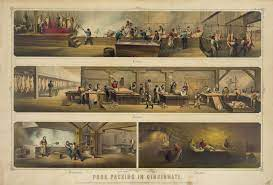The thing that made me “wow” in this class was the topic of industrialization. More precisely, the fact that although industrialization was the economic forcing factor, it also left many Americans unemployed was interesting to me. According to Locke and Wright (2019), economic progress, technical innovation, social and cultural evolution, and demographic shifts revolutionized the United States. Since the commencement of the industrialization and industrial revolution, the process of automation, or more broadly the replacement of human employees by machines, has piqued widespread interest.
Mechanization, workers thought, would push them out of work, raise unemployment, and bring poverty and suffering to vast swaths of society. The problem was primarily latent for the most part, but it erupted now and then, especially amid technical breakthroughs. Locke and Wright (2019) also support this idea by presenting food production and consumption examples. The industrialization in big cities led to the creation of integrated national markets that united rural vendors and urban customers. For example, Chicago become the country’s butcher with just several large-scale industrial meatpackers who produced “four fifths of the meat bought by American consumers” (“American yawp: Life in industrial America,” n.d., p. 1). Known as the Gateway City, Chicago served as a main crossroad for local agricultural goods and European capital market (Locke & Wright, 2019). On the one hand, it is amazing how single cities became so important in a short period of time. On the other hand, this led to an increase in unemployment as industrialized machines replaced workers’ positions.

After investigating the topic and further studying, I have learned some terms regarding unemployment during the industrialization revolution. For example, pauperism is used by Locke and Wright (2019) as something negative and means extreme poverty, which can be linked to the unemployment level rise among Americans. In addition, it was very interesting for me to see how the word yawp was introduced in a new context signifying rapid development.
References
American yawp: Life in industrial America. (n.d.). p. 1-22.
Locke, J. J. & Wright, B (Ed.). (2019). The American Yawp: A Massively Collaborative Open U.S. History Textbook. Stanford, California: Stanford University Press.